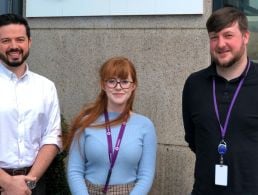Many of the top tech firms need sales representatives. What do you need to know if you’re interested in that role?
One of the most common misconceptions about the tech industry is that all of the jobs are technology-based.
Therefore, it’s no surprise that some people are turned off from looking at such jobs because they don’t feel they have the necessary qualifications or experience.
However, there are so many more aspects of a technology company that keep it running, such as sales.
So, what do you need to know about working in sales for a tech firm? Annika Gunzenhäuser is a sales development representative at New Relic. Here, she tells us what her job is like and the skills she needs.
What is your role within New Relic?
I’m an enterprise sales development representative at New Relic. This means I work with IT and business leaders across various industries in the enterprise sector who are interested in transforming their businesses and optimising their digital initiatives to stay competitive in the fast-paced digital age.
It’s an exciting role because I get to partner with the world’s leading companies – primarily ones based in Germany, Austria and Switzerland – to help identify ways to improve their processes of digitalisation and offer innovative solutions to problems they are facing along the way.
A vast majority of companies are looking to digitally transform their businesses which can often be challenging; keeping up with the latest technologies and nimble competitors can be tough.
Oftentimes, this means adopting the cloud, embracing DevOps and improving their digital customer experience, which are all complex projects. In this regard, I collaborate closely with various teams internally, from sales teams and solution consultants, to marketing, support and partner managers to provide our customers with the resources they need to innovate fast.
If there is such a thing, can you describe a typical day in the job?
New situations arise every day but typically I focus my work on researching and actively reaching out to companies that are looking to optimise their digital strategies.
In addition, I also reach out to incoming leads (companies that have expressed interest in New Relic). I work with these companies to build up a relationship and formulate New Relic’s business in a meaningful way.
Communication is key in my role, so I spend most of my time on the phone, sending emails and professionally networking. I’m responsible for building relationships with prospects, understanding and qualifying their needs and interests, and providing them with information on our platform as well as on a possible collaboration.
Essentially, I get companies interested in and excited about what New Relic can offer their business; then, eventually I engage with our account management team for a formal introduction.
Of course, all of this work is based on research of the market, industries, companies and contacts as well as close collaboration with sales, marketing and technical teams.
Additionally, supporting existing customers and customers trialling New Relic, and attending trade shows and customer events are part of the job as well.
What types of project do you work on?
Most of my time is focused on building new relationships with organisations and expanding engagement with existing customers in order to help them further improve their digital projects.
I tend to focus on a couple of companies at a time, understand their current business focus and initiatives, and analyse if and in what way a collaboration would be beneficial for them.
Engaging with such a broad field of customers is very insightful as you learn a lot about their businesses as well as the market, and every project is different – so it never gets boring.
What skills do you use on a daily basis?
First of all, communication skills are key. Being able to listen to what people are actually saying and express myself and New Relic’s value proposition in a way that shows credibility and adds value is the foundation of success for my job.
Presentation skills also play a hand here; I want to make sure I can bring my message across accurately and in a compelling way.
Strategy and organisation are highly important, too – not only to understand who to contact and why, but also when to contact them and how to structure and improve your work processes. I suggest planning ahead. Being organised also means documenting your work and being organised in an administrative manner.
Being persistent is the third thing that I find really important. I’m persistent when reaching out to contacts and in working toward my internal goals.
Finally, at least some technical understanding helps in building messaging and identifying business value, which is why motivation and the ability to learn more about the technologies and market trends are important as well.
What is the hardest part of your working day?
It can feel like a setback when you invest a lot of time and energy in researching a company’s needs and building a relationship to later discover that the prospective partnership doesn’t work. Even though this aspect of my job can be tough, I’m learning some critical skills that will set me up for success in the future.
New Relic is a pretty technical product and I’m acquiring ways of how to best explain the business value for our customers in ways that resonate with them. Ultimately, these setbacks are what help me build a stronger strategy for the next pitch.
Do you have any productivity tips that help you through the working day?
Start your day with a call blitz or a customer meeting – it really helps get your energy levels up in the morning and keeps you active and productive throughout the day.
Also, time management is very important. Be smart about when to schedule meetings, and keep in mind that some days and some times throughout the day are better for calling and emailing than others.
When you first started this job, what were you most surprised to learn was important in the role?
Working in sales development requires more strategic planning than I expected initially. It is not simply messaging people randomly and calling long lists of contacts, as sometimes perceived from the outside. You need to identify and understand the companies and people you engage with, and understand how they could benefit from collaborating with you.
It’s been a pleasant surprise to be such an integral part of the sales team. As a sales development representative, I’m often the first point of contact for our customers and it’s great to be able to have a hand in shaping that first impression.
How has this role changed as this sector has grown and evolved?
In the relatively short time I’ve been in this role, I’ve seen more excitement and adoptions of what New Relic has to offer. More and more companies are adopting cloud and DevOps strategies and, to support this increase in interest, my team has grown considerably over the past few months and we’re focusing more on proactively approaching companies.
What do you enjoy most about the job?
It is great to experience and be part of the drive of digital transformation happening across the market. I enjoy helping companies keep up with these various rapid changes and enabling them to stay competitive. There’s great momentum in the market, with a large majority of organisations adopting new strategies to keep up with new technologies, processes and trends.
This is also especially exciting with a closer focus on my current position and what lies ahead for me at New Relic as I’m preparing to move into the next role in the future.
Additionally, being a mentor to new members in my team offers a great chance to not only help colleagues getting up to speed and provide guidance, but also to review your own way of working and exchange ideas.
Finally, outside the normal work context, we also have fun at New Relic with after-work events (barbecue, table quiz, pool competition – just to name a few), lunchtime yoga classes or charity days.
Want to work at New Relic? Check out the New Relic careers page for current vacancies.




